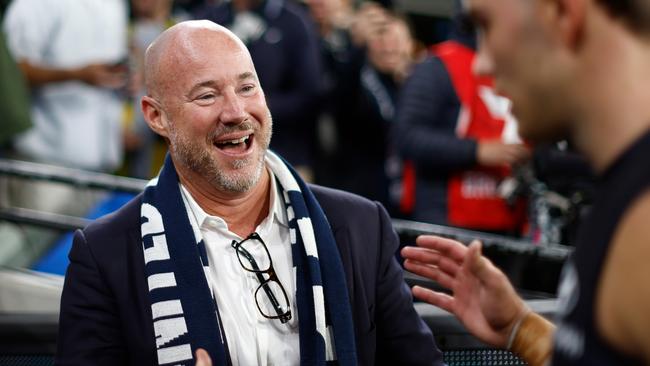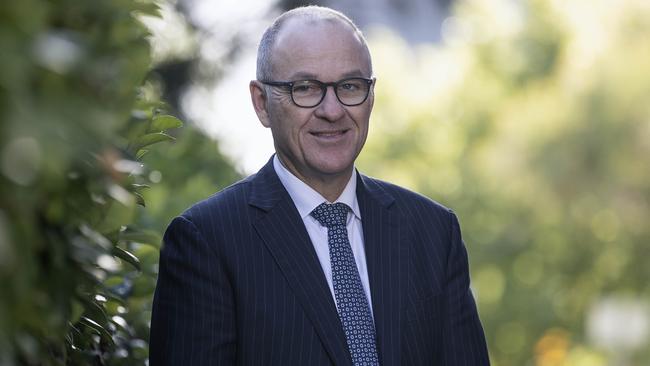PwC Aus hit with a US penalty for compliance breach under ex-CEO Tom Seymour
The accounting firm must pay nearly $1m for violating US compliance rules but that hasn’t stopped former boss Luke Sayers rejecting criticism from a Senate committee.

Accounting giant PwC Australia’s leadership missteps have been highlighted in a new disciplinary order by US agency the Public Company Accounting Oversight Board, which also includes a $US600,000 ($920,820) civil penalty.
In an overnight order, the PCAOB, which is overseen by the US Securities and Exchange Commission, said the sanctions specifically address the firm’s failure to timely report the initiation and conclusion of proceedings against it by the Australian Tax Practitioners Board.
The PCAOB’s order details, PwC Australia’s then-chief executive officer, members of the firm’s Office of General Counsel, Strategy, Risk, and Reputation Group, and Financial Advisory Services practice were aware of the TPB investigation as early as March 2021 and related proceedings as early as February 2022.
They also participated in preparing the responses to the TPB, yet no one shared information with those responsible for reporting compliance. These individuals got to know about the proceedings via media in early May 2023, the PCAOB’s order states.
“Even then, the firm failed to file mandatory Form 3s until June 20, 2023.”
The PCAOB did not name the former chief executive, but Tom Seymour held the role at PwC Australia from May 2020 to May 2023.
The PCAOB also found that PwC Australia’s quality control monitoring processes failed to identify the siloed nature of its primary practice areas.
“Contemporaneous reporting of Form 3 events is an important part of the PCAOB regulatory framework designed to protect investors,” said Robert Rice, director of the PCAOB’s division of enforcement and investigations.

PwC Australia has consented to the order – which calls for payment in 10 days – and is also required to undertake certain remedial measures to establish, revise, or supplement, as necessary, policies and procedures.
It comes as his predecessor Luke Sayers, who was chief executive from April 2012 to May 2020, hit back at claims his evidence to a Senate committee was “implausible”, saying he wanted to focus on broader reforms to the consulting sector rather than “responding to personal and unjustified” attacks.
A Senate committee warned on Wednesday that PwC Australia had failed to be open and honest with the firm told it cannot hope to recover its reputation “while it continues to cover up” the tax scandal haunting the audit and consulting giant.
The Finance and Public Administration committee took aim at PwC in a report titled “The cover-up worsens the crime”, stating Mr Sayers’ evidence to the committee was “implausible”, noting the veteran consultant risked having his “truthfulness” and credibility questioned.
Mr Sayers responded with a strongly worded statement on Thursday, criticising attacks on his evidence to the committee.
“The report confirms that the misconduct in PwC’s International Tax group was not identified until well after I left the firm. I was not aware of it, but I have already accepted accountability and apologised that it happened on my watch,” Mr Sayers said.
“I also gave evidence that the Australian Taxation Office had raised issues about the culture and practices in the Tax group with me. It is just wrong to allege I could not recall these matters being raised or that they were not raised with the board.”
The founder of consultancy business Sayers and chair of Carlton Football Club has attempted to steer clear of the scandal, which took place under his watch.
Still, the committee said it was “impossible to reconcile the different versions and recollections of events provided by the witnesses”.
“Taken together, the evidence points to the unethical behaviour in PwC being ignored by senior leadership during Mr Sayers’ term as CEO and subsequently,” the report noted.
Mr Sayers said on Thursday said he was “someone who recognised the structural risks at PwC and tried to address them” at the time while also welcoming the parliament’s overdue focus on governance and transparency in the consulting sector.
However, he disputed there was a broader “culture problem” endemic at PwC.
“It is also wrong, and an unfair reflection on the many thousands of decent PwC people doing great work, to claim there was a firm-wide culture problem,” Mr Sayers said.
“And as I said at the committee hearing, if the ATO had evidence of a breach of confidence by the International Tax group it should have formally and directly notified me. It did not. The ATO’s own evidence was that it was a crime to share that information.”
In a report released on Wednesday, the Senate committee took aim at the professional services heavyweight over its responses to revelations its senior leadership and tax partners misused confidential information in a bid to make money.
The report warned the tax scandal, which saw PwC international tax head Peter Collins share confidential tax briefings within the firm, showed “internal management and audit controls failed or were broken”.
However, the high profile businessman rejected commentary contained in the report.
“I am more interested in genuine reforms to deal with the structural and governance challenges facing the whole consultancy sector than responding to personal and unjustified attacks on me,” Mr Sayers said. “I reject the opinions and editorial commentary in the report.”
The report comes after months of hearings in the Senate, amid an ongoing investigation into the tax leaks by the Australian Federal Police as well as nine probes from the Tax Practitioners Board into the scandal.
The Senate committee said PwC’s attempts to investigate the tax leaks have fallen flat, criticising the firm’s failure to share a report into the scandal prepared by law firm Linklaters on behalf of PwC international.







